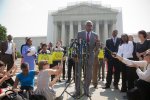The movie Selma has won strong reviews from critics. At least one defender of Lyndon B. Johnson, however, says the filmmakers got some of the facts wrong (as if that’s a surprise when Hollywood does history), particularly in the movie’s portrayal of Johnson’s relationship with Martin Luther King Jr. and the president’s support of the Voting Rights Act, which celebrates its 50th anniversary this summer (though not without undergoing frequent legal challenges of late).
I have not seen Selma so can’t weigh in on either its cinematic qualities or historical accuracy. But someone who has definite thoughts on the latter is Joseph Califano, a Johnson staffer in 1965. In an op-ed piece for the Washington Post, Califano wrote that LBJ considered the VRA one of his greatest accomplishments. Califano also said that the march on Selma was the president’s idea. I doubt that, but from the research I did for a recent You Choose book on the VRA, there seems little doubt that King and Johnson were working toward the same end before the violence in Selma and the later Selma-to-Montgomery march that did take place.
Here’s how David J. Garrow paints the picture in his 1979 book Protest at Selma: On February 9, 1965, King met with LBJ at the White House—not their first time together to discuss civil rights—and King emerged to tell reporters, “The president made it very clear to me that he was determined…to see all remaining obstacles removed to the right of Negroes to vote.” This was after the Justice Department had already drafted language for legislation to protect voting rights. King praised Johnson for his “deep commitment to obtaining the right to vote for all Americans.”
Garrow’s depiction of the story seems to back Califano, so if Selma suggests there was some basic disagreement between LBJ and Johnson, then it’s bad history. But films and facts aside, what caught my eye in the Califano piece was his reference to an incident in the days of Selma 1965 that is little known today—but that played a major part in one of the threads in my book on the Voting Rights Act.
Califano mentioned that “a white minister from Boston was killed” after the initial violence in Selma on March 7. That white minister was James J. Reeb, a Unitarian Universalist who had moved from Philadelphia to Boston in 1964 to work for the American Friends Service Committee. The Quakers were working to improve housing for poor African Americans in the notoriously racist “Athens of America,” and Reeb, who was committed to civil rights, took over their program there. Reeb remained active with his denomination’s ministers’ association and a committee on race, though he did not have a congregation of his own.
On March 7, 1965, civil rights marchers in Selma attempted to march to Montgomery and were brutally attacked by Alabama state police, county sheriffs, and horse-riding local vigilantes known as possemen. Reverend King quickly put out a call to religious organizations across the country. He wanted both blacks and whites to converge on Selma and protest the state-sanctioned violence and continue the fight for voting rights for all. “In this way,” his telegram read, “all America will testify that that the struggle in Selma is for the survival of democracy in our land.” Reeb answered the call, joining about 60 other Boston-area Unitarians in traveling to Selma.
Reeb knew he was entering a violent arena, and his wife did not want him to go. But on March 9, he found himself marching through Selma with hundreds of other whites and many more blacks, as the civil rights activists once again tried to head to Montgomery. King, who had not participated in the first march, led the peaceful protesters. Alabama state troopers once again halted them, but this time without violence.
That evening, Reeb was walking through Selma with two other Unitarian reverends. Looking for a place to eat, they ended up in a “black” café. Later, four local whites spotted them leaving the black establishment. White Selma residents had no love for Northern whites who supported blacks in their fight for civil rights. One of the men swung a metal pipe that caught Reeb in the head. Clark Olsen, one of the men with Reeb, later said the assailant’s face was “intense and vicious.” The other men attacked Olsen and the third minister with their feet and fists. As the beating went on, one of the white men said, “Here’s how it feels to be a nigger down here.”
Reeb was able to stand and walk away, but his head injury soon left him incoherent. Within two days, he was dead. Not surprisingly, the death of a white minister in Selma drew national attention. On March 15, speaking to Congress to urge passage of the Voting Rights Act he was about to introduce, President Johnson noted Reeb’s violent end (which would go unpunished, despite Olsen’s eyewitness testimony against three men charged with the assault).
Johnson said, “At times history and fate meet at a single time in a single place to shape a turning point in man’s unending search for freedom. So it was at Lexington and Concord. So it was a century ago at Appomattox. So it was last week in Selma, Alabama. There, long-suffering men and women peacefully protested the denial of their rights as Americans. Many were brutally assaulted. One good man, a man of God, was killed.”

Wade Henderson of the Leadership Conference on Civil and Human Rights speaks out against the U.S. Supreme Court’s 2013 decision to strike down part of the Voting Rights Act. Click on the pic to read the New York Times story on the decision.
Reeb has been called a martyr of the civil rights movement. His efforts show, as Johnson’s did, that some whites knew in 1965 that it was time to take action in creating the democracy we claim to cherish. It’s a shame that 50 years later, other whites still want to make it hard for all Americans to exercise their right to vote.



